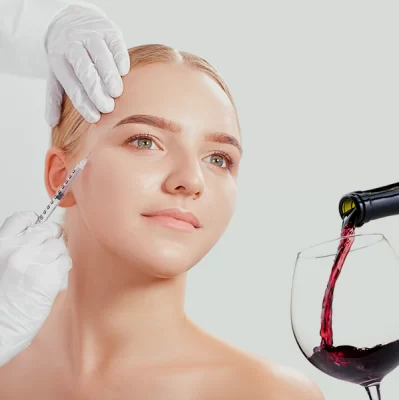Botox and alcohol
- Why is consuming alcohol after Botox not recommended?
- How does alcohol affect the effects of Botox?
- The impact of alcohol on the skin healing process after Botox
- What are the recommendations for avoiding alcohol before and after Botox?
- How long should one avoid alcohol after Botox treatment?
- What are the consequences of consuming alcohol after botox?
Consuming alcohol after botox treatment is definitely not recommended for several important reasons:
- Alcohol thins the blood, which can lead to bruising and hematoma at the injection sites,
- Alcohol slows down the skin healing process, which is especially susceptible to damage after such a procedure,
- Alcohol raises blood pressure, weakening the effectiveness of botox and increasing the risk of swelling,
- Dehydration caused by alcohol consumption weakens the skin's protective barrier, making it more sensitive to micro-damage,
- The final effect of the procedure may not meet expectations if alcohol is consumed.
It is recommended to abstain from alcohol for at least 24 hours after botox application. This action minimizes the risk of complications and allows for the best aesthetic outcome. Consuming alcohol after the procedure can prolong the recovery period and lead to health issues related to swelling or bruising.
Avoiding alcohol not only promotes skin healing but also enhances the effects of botox itself. Therefore, adhering to recommendations for abstinence before and after the treatment is crucial for achieving the best results. Abstaining from alcohol contributes to maintaining healthy skin and satisfying aesthetic outcomes.
Consuming alcohol after a Botox treatment can negatively affect its effects and safety. Alcohol thins the blood, increasing the risk of bruising and hematomas in the areas where botulinum toxin was injected. Additionally, it leads to dehydration, weakening the skin's protective barrier, making it more susceptible to damage.
Dehydrated skin heals more slowly and is more prone to swelling. As a result, alcohol can prolong the recovery time and reduce the effectiveness of Botox. To achieve the best aesthetic results and reduce the risk of complications, it is recommended to avoid alcohol for at least 24 hours after the procedure.
Check out what are the alternatives to Botox.
Alcohol has a significant impact on the skin healing process after a botox procedure. It increases the risk of bruising and hematoma in the areas where injections were administered. Furthermore, alcohol dehydrates the skin, making it more susceptible to damage, which can negatively affect the outcome of the procedure. The skin regeneration process is slower, resulting in a longer recovery period and difficulties in achieving satisfactory aesthetic results. For these reasons, it is advisable to avoid alcohol after the procedure to recover more quickly and prevent health complications.
It is recommended to avoid alcohol for a week before undergoing a Botox procedure to reduce the risk of bruising. It is also important to stay well hydrated and avoid medications such as aspirin or ibuprofen, which can affect blood clotting. After the procedure, it is advised to refrain from consuming alcohol for at least 24 hours. Alcohol can weaken the effects of Botox by dehydrating the skin and promoting swelling. Additionally, alcohol can delay the skin regeneration process, negatively impacting the final aesthetic result. Adhering to these recommendations both before and after the procedure is essential to achieve optimal results and avoid health complications.
After a botox procedure, it is recommended to abstain from consuming alcohol for at least 24 hours, and sometimes even up to 3 days, in order to minimize the risk of complications and achieve better aesthetic results. Maintaining abstinence post-procedure is necessary for optimal injection outcomes and skin health. Check when it is worth considering the first botox.
Consuming alcohol after a Botox procedure can lead to serious health and aesthetic problems. Alcohol increases the likelihood of bruising and discoloration around the injection sites. Additionally, it dehydrates the skin, making it more susceptible to damage and prolonging the required recovery time. Furthermore, swelling may be more pronounced and persistent, affecting the final outcome of the procedure.
Alcohol negatively affects the skin healing process, increasing the risk of micro-damage, which can result in unsatisfactory Botox effects. Therefore, avoiding alcohol consumption for at least a day after the procedure is essential to minimize risks and achieve optimal aesthetic results.
It is also recommended to abstain from alcohol consumption a week before undergoing Botox injections. This helps reduce the risk of bruising.
